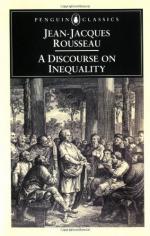
|
| Name: _________________________ | Period: ___________________ |
This test consists of 15 multiple choice questions and 5 short answer questions.
Multiple Choice Questions
1. What did men dwell on according to Rousseau in "Chapter 4, A Discourse on the Origin of Inequality, Part One"?
(a) Wants.
(b) Needs.
(c) Love.
(d) Desire.
2. According to Rousseau, what was life of man limited to before his interests grew?
(a) Survival.
(b) Family.
(c) Reproduction.
(d) Sensation.
3. What did the poor become, according to Rousseau?
(a) Moral.
(b) Rude.
(c) Thieves.
(d) Greedy.
4. What does Rousseau think humans are called to in "Chapter 6, A Discourse on the Origin of Inequality, Appendix"?
(a) Perfection and stability.
(b) Happiness and wealth.
(c) Perfection and wealth.
(d) Happiness and perfection.
5. According to Rousseau, what is the outcome of man's labor?
(a) Continual suffrage.
(b) More resources.
(c) Nothing.
(d) More greed.
6. What does Rousseau mention men differ in as common character starts to develop within the human?
(a) Beauty and wealth.
(b) Beauty and talent.
(c) Wealth and beauty.
(d) Wealth only.
7. What was man's first feeling, according to Rousseau?
(a) Self preservation.
(b) His breath.
(c) His existense.
(d) Crying.
8. What happened as words grew in number?
(a) Power.
(b) Religion.
(c) Cognition.
(d) Speech.
9. What does amore-propre preserve?
(a) The nature.
(b) The greed.
(c) The species.
(d) The desire.
10. What do men learn to repress as a result of jealousy, according to Rousseau?
(a) Their natural emotions.
(b) Their heated emotions.
(c) Their irrational emotions.
(d) Their overall emotions.
11. According to Rousseau, what is the natural or physical inequality established by?
(a) Nature.
(b) Weather.
(c) Society.
(d) Government.
12. According to Rousseau, what do passions allow for the human?
(a) Improvement of reason.
(b) Fears and dreams.
(c) Degeneration.
(d) Nothing.
13. What is the final stage of maturation of inequality, according to "Chapter 5, A Discourse on the Origin of Inequality, Part Two"?
(a) Talent.
(b) Ego.
(c) Despotism.
(d) Desire.
14. What does Rousseau believe does not preserve one's liberty?
(a) Laughing at one's liberty.
(b) Using one's liberty.
(c) Ignoring one's liberty.
(d) Alienation of one's liberty.
15. What did some individuals grow rich enough for as a result of inventions?
(a) Pleasure.
(b) Indulgence.
(c) Leisure.
(d) Governing.
Short Answer Questions
1. How does Rousseau think the gods will react to people forming a more perfect union?
2. What was man's second feeling, according to Rousseau?
3. According to Rousseau, who destroyed human compassion?
4. Which of the following was NOT mentioned being a result of luxury?
5. What does Rousseau believe helped man use nature?
|
This section contains 380 words (approx. 2 pages at 300 words per page) |

|




